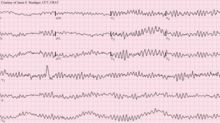Ischemic hepatitis
| Ischemic hepatitis | |
|---|---|
| Other names | Ischemic hepatopathy , Shock liver |
 | |
| Histopathology of shock liver, showing its hallmark[1] pathologic finding centrilobular necrosis but viable periportal hepatocytes. H&E stain. The necrotic hepatocytes have barely discernible nuclei. | |
| Symptoms | Mental confusion[2] |
| Causes | Heart failure, Infection[3] |
| Diagnostic method | Doppler ultrasound, Blood test[3] |
| Treatment | Resuscitation(acute), Stabilize underlining illness(chronic)[4] |
Ischemic hepatitis, also known as shock liver, is a condition defined as an acute liver injury caused by insufficient blood flow (and consequently insufficient oxygen delivery) to the
Signs and symptoms
People who develop ischemic hepatitis may have weakness, fatigue, mental confusion, and low urine production (
Cause

Ischemic hepatitis can be caused by a number of reasons (that lead to low blood pressure) including:[3]
- Abnormal heart rhythm
- Heart failure
- Infection
- Hypovolemic shock (e.g., due to profuse bleeding)
- hepatic arteryafter surgery)
Mechanism
The mechanism of ischemic hepatitis depends on the etiopathogenetic origin, be it a cardiomyopathy, cardiac tamponade, trauma, or bleeding.[6] Usually ischemic hepatitis reveals itself after a hypotensive event with increased levels of aminotransferases.[7] Because of this, hypotension is thought to be one of the primary insults leading to ischemic hepatitis.[8]
Diagnosis

Blood testing usually shows markedly high elevations of both liver transaminase enzymes, AST and ALT, which may exceed 10,000 U/L.[9] It has been found that those who suffer from ischemic hepatitis had significant cardiac disease as well.[10]
As a measure of precaution, paracetamol levels and a toxicology screening should be completed to evaluate for possible toxin-mediated injury; it is also imperative to be able to exclude the possibility of acute viral hepatitis.[11]
Related conditions
Ischemic hepatitis is related to another condition called congestive hepatopathy. Congestive hepatopathy includes a number of liver disorders that occur in right-sided heart failure. The medical term congestive hepatopathy is used, however, the term cardiac cirrhosis is convention. These two entities can coexist in an affected individual.[12]
Treatment
The treatment of ischemic hepatitis is as follows:[13]
- Antibiotic treatment if a bacterial infection causing septic shock is present
- Restore and maintain adequate blood pressure
- Medication
- Control any gastrointestinal bleeding
See also
References
- PMID 29868133.
- ^ ISBN 9788131216743.
- ^ a b c "Hepatic ischemia: MedlinePlus Medical Encyclopedia". www.nlm.nih.gov. Retrieved 2015-08-24.
- ISBN 9780323529570. Retrieved 2 January 2018.
- ISBN 9783642045196.
- ISBN 9789351527404.
- ISBN 9783540671367.
- ISBN 978-1437727678.
- S2CID 20312771.
- ISBN 978-1437708813.
- ISBN 9781444346367.
- ^ "Cardiac Cirrhosis and Congestive Hepatopathy: Background, Pathophysiology, Epidemiology". 2018-06-28.
{{cite journal}}: Cite journal requires|journal=(help) - ISBN 9781420016840.
Further reading
- Kirk, Allan D.; Knechtle, Stuart J.; Larsen, Christian P.; Madsen, Joren C.; Pearson, Thomas C.; Webber, Steven A. (2014-07-21). Textbook of Organ Transplantation Set. John Wiley & Sons. ISBN 9781118889626.
- Irwin, Richard S.; Rippe, James M. (2012-03-28). Manual of Intensive Care Medicine. Lippincott Williams & Wilkins. ISBN 9781451149074.
